Your Planets
Portraits of the Planets
Aspects between Planets
The planetary ages
The planetary families
Planets in Signs
The Planets in comics
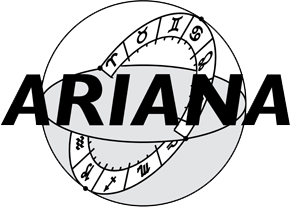

The age of two marks a new stage in a child’s development. He ceases to be a baby and begins to do everything possible to be admitted into the society of “big”. Two years (duration of the sidereal revolution of mars) at the age of twelve, he will make a number of new apprenticeships placed under the guidance of Jupiter, the largest planet in the solar system, whose rounded sidereal revolution time is twelve years.


The Jupiterian stage is therefore spread over ten years. A very long period, if we compare it to the single year that the previous stage lasts or to the four and a half months during which the solar function is integrated. One can legitimately wonder whether the different mental, social and affective acquisitions of the child during such a large age range have points in common and reflect a real functional unity. How is a four-year-old like a twelve-year-old? Apparently, a whole world seems to separate them, and yet, when we analyze in depth all the new learning that characterizes this ten-year period, we find a real unity.
The Jupiterian stage (from two to twelve years old) and the saturnian stage (from twelve to thirty years) being particularly long, I have chosen to devote longer pages to them. This does not mean, however, that they are more essential than the previous stages: all stages of learning are equally important. If I thought it useful to dwell on these periods, it is because they are the most influential, the most decisive with regard to the field of education.
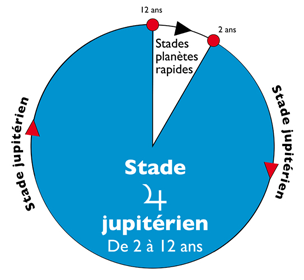
Astrology attributed very early to Jupiter professions involving an intensive use of language: actor, representative, parliamentarian, lawyer, minister… which does not mean that all children born under a strong influence of Jupiter will certainly exercise one of these prestigious professions. But precisely, it is from the age of two that the child once again enters a new universe: that of conventional language. The specialists evoke on this subject a real “lexical explosion” : the number of words that the child learns and pronounces increases from the beginning of the third year in a vertiginous way. If at two years old he was only able to link two or more words to make a sentence, at three years old he already masters his mother tongue in an impressive way, knows about nine hundred words and the elementary rules of grammar. And for the next five years, he acquired a new word every hour!
The Jupiterian stage therefore sees the appearance of conventional language. Gone is the expressive jargon, pithy telegraphic style of the baby at the Marsian stage. He entered the era of “grammatically correct”. He can now clearly represent and describe things, beings and situations, even in their total absence, through the power of words and various systems of representation. Thanks to language, he learns to effectively coordinate his experience, his experiences with his mental images, to give a precise meaning to each of his actions or the facts he observes. He is no longer hostage to his raw experience, as was the case until now: his existence is now immersed in a universe of images, words, symbols. Whereas until now he expressed himself essentially through acts and affective behaviors, he can make himself understood, transmit his desires, his emotions and his thoughts through speech.
Fabulous discovery! At the beginning, access to language brings the child into a magical and marvelous world for him. From now on, words can replace things. They can convey an unreal world (fairy tales), which replaces the real world. Thus the child at the beginning of the Jupiterian stage willingly mixes the world of representations and that of objects; for him, the word merges with the thing, and speaking becomes as mechanical as any other activity. At this stage, language has no communicative function: the child, egocentric, often speaks alone, for the simple pleasure of speaking, unless he engages with his little playmates in “collective monologues”, mock conversations where everyone seems to be talking to the other but no one is communicating.
It thus often happens to the child of preschool age, when he is unable to achieve the goals he has set himself, to be persuaded to be able to transform his situation by the magic of language alone, and therefore to speak as if he had succeeded in having an effective action on things: “Shut up, thunder, you’re bothering me”, can say a child who is afraid of the storm. Through the power of evocation and invocation of language, he naively attempts to ward off the shortcomings of his experience, to exercise an imaginary authority over elements and events. He tells stories…
It is only with school age and the many new social relationships that it implies that language will fully fulfill its communication function. The child is then said to have acquired the “socialized language” : he becomes able to transmit information to others and to receive it from him by alternating speaking time and listening time. He can adopt a critical attitude towards the other: “I listened to you but I don’t agree”, give orders, make requests, threaten and above all exchange questions and answers. When this socialized language is fully integrated, it can, by governing and expressing thought, become a guide to action as well as a vehicle of communication.
As long as we use the same words to describe the same things, that is to say that we speak a conventional, official language (that of dictionaries), discussion, and therefore reasonable negotiation become possible. At two years old, the child understood only the physical power relationships. He showed his displeasure, justified or not, by throwing his blocks, getting angry or hitting. As soon as socialized language is acquired, he can lay down his arms and verbally explain his reasons for dissatisfaction, assert what he considers to be his rights, defend his cause, listen to the explanation of the motivations and requests of others… and possibly recognizing one’s own faults: it is an essential function of language to allow mediation in the conflicts inherent in existence.
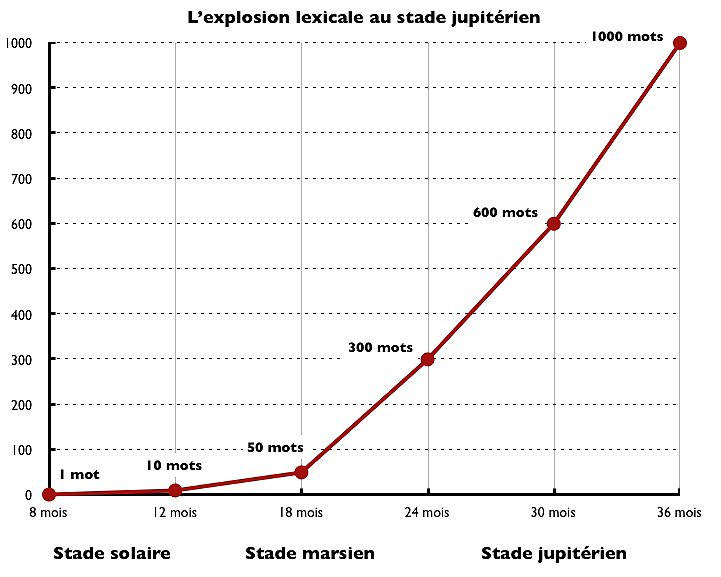 By tearing him away from the dictatorship of his first impulses, of his visceral reactions, language contributes to powerfully socialize the child. Sharing the same mother tongue also means sharing the same culture, the same general vision of the world, the same habits and customs, and the same taboos too. There is no life in society without a common language, that is to say without a common rule, and common language is the first of the rules of life in society. From birth to two years old, the child has unconsciously then consciously integrated the music, the intonations and then the rudiments of this language. At two years old, he began to understand the words, to make them his own and to want to express himself through them, to participate in the collective choir.
By tearing him away from the dictatorship of his first impulses, of his visceral reactions, language contributes to powerfully socialize the child. Sharing the same mother tongue also means sharing the same culture, the same general vision of the world, the same habits and customs, and the same taboos too. There is no life in society without a common language, that is to say without a common rule, and common language is the first of the rules of life in society. From birth to two years old, the child has unconsciously then consciously integrated the music, the intonations and then the rudiments of this language. At two years old, he began to understand the words, to make them his own and to want to express himself through them, to participate in the collective choir.
By assimilating conventional language and its rules, the child acculturates, in other words, he adapts, whether he likes it or not, to a spiritual and material culture, to philosophical, religious or political beliefs, to behaviors standards. The French child learns to behave as an exemplary Frenchman, the Zairian as a perfect Zairian citizen. Through language, he sees himself transmitted, depending on the social background of his parents, a popular or elitist culture, the vision of the world of the poor or the rich. By speaking, he agrees to insert his personal experience into a circuit of codified exchanges, to discipline his instinctive impulses, to inhibit his spontaneous reactions in order to be admitted into a world which has its norms, laws, rules, totems and taboos. He learns that there is “what is done” And “what is not done”.
Of this world governed by laws, he had already become aware between eight and twelve months, during the solar stage. But before a year, he was content to passively adopt the model behaviors that earned him the consideration of adults and the tacit renewal of a recognition that was for him a due, an indisputable evidence. After two years, the child wishes on the contrary to actively participate in this social life and to conquer, by proving himself, a public esteem which he judges to be a reward for his concrete skills.
His experience now enters into a legislative, normative framework. even if he has acquired a great deal of autonomy, that he is able to do many things when he feels like it, he now knows that he can no longer afford everything, that his experience and that of others are subject to invariable, inflexible and demanding laws that sanction his pranks and reward his model behaviors.
It now coordinates all of its activities by subordinating them to rules. He learns to obey, to submit more or less voluntarily to the common law, to an organized system of opinions, precepts, values, moral imperatives that parents and teachers impose on him. Far from viscerally rejecting this system in a movement of primary indiscipline as he did between one and two years during the Marsian stage, he cooperates with it fully, by accepting it as it is, without any criticism, or else, by trying to find what is good and above all fair in relation to his own experience. Anyway, he tries to “GOOD” to do, that is, to act in accordance with the patterns of action and thought transmitted to him by adults. It is at this price, he knows, that he will be fully recognized as a normal citizen.
It is between two and seven years that the “moral sense” appears. It manifests itself first, according to Jean Piaget, by a “primary moral realism, according to which obligations and values are determined by the law or the order itself, independently of intentions and relationships”. So for the child under seven years old, “is just what complies with the instructions imposed by the adult world”. At worst, he therefore learns at this age the flattest conformism, that of “fear of the policeman”, even if it means cheating when he can, like “not seen not caught”. We also know that the first traces of cultural prejudice appear from the age of two, and that they are subsequently, even in adulthood, very difficult to dislodge!
Around the age of seven, the child passes from the premoral level (obedience for fear of displeasing or being punished) to the level of intentional morality (internalization and understanding of the norms of the environment): according to Jean Piaget, “the child comes to new moral relationships, based on mutual respect. An essential product of mutual respect and reciprocity is the feeling of justice, often acquired at the expense of the parents (on the occasion of an unintentional injustice, for example). However, at the age of seven to eight, and increasingly thereafter, justice will prevail over obedience and will become the central norm.” At best, the child is then animated by a spirit of active collaboration governed by freely accepted rules which can be discussed, amended and reformulated if the circumstances so require.
For the child of two to twelve years old, things can no longer exist “like that”, for themselves: they must have a meaning, a goal, a usefulness, a purpose, an orientation that defines them and gives them meaning. At the beginning of the Jupiterian stage, this need for meaning is expressed in a frenetic way through the famous “Why?” that the three-year-old child keeps uttering: “Mom, why is it raining?” “To water the geraniums, my dear”. It is useless at the beginning to try to make the child understand what are the geophysical and meteorological mechanisms at the origin of the rain: not only is he unable to understand them, but moreover he does not care. If the rain has any use, it is enough for him. It is oriented, it has a meaning, it serves a purpose. These “Why” therefore never aim to obtain an answer concerning root causes, but demonstrates that the child of this age demonstrates a deep need for logic and a strong desire to rationalize cause and effect relationships, and to understand the relations of order which unite the phenomena which he observes.
By evolving as the child approaches the age of twelve, this quest for meaning and “common sense” which makes it possible to evaluate the concrete characteristics and the usefulness of beings, things and situations will gradually become more sophisticated. The demand for logic and rationalization soon turns into “categorical thinking”, looking for “invariant” which will gradually make him discover the “preservation principles” what are volumes, numbers, weight, matter, height, time and speed. From then on the world is no longer for him a kind of “perceptual chaos” where things do what they want. It is governed by precise and invariable laws.
Of course, at the beginning, nothing is simple: if one pours under his eyes a liter of water from a spherical container into a rectangular container, he is unable to isolate the“invariant” substance-water for him, then there is “spherical water” And “rectangular water” which have nothing in common. It is only at the end of the Jupiterian stage, between eight and twelve years old, that he will recognize and be able to understand that a substance remains the same regardless of the container that contains it, that a kilo of feathers weighs the same weight as a kilo of lead, and the volume of a liter of water is the same whether the liquid is in an oblong vase or in a pie dish. In the changing and often deceptive world of immediate perceptions, he then understood that there remained elements of unity, stability and, in short, order.
All this shows that the child at twelve is capable of classifying, of comparing, of measuring things according to invariable rules. It has concrete and reliable points of reference in existence. In all senses of the term, he demonstrates common sense: he knows how to orient his activities pragmatically and usefully according to a well-defined rule accepted by all, correctly evaluate the information transmitted to him by his senses, and seek in all things indisputable criteria allowing him to weigh his judgments. This is how he learns to learn invariable lessons from his experiences and those of others.
Among these invariants newly acquired by the child over two years of age is time. He no longer lives in the here and now of the Mars stadium. Thanks to language and therefore to conscious memory, he is now able to represent the front (“When I was a little baby”) and after (“When I grow up, etc.”). He can both remember the past and project himself into the future. He is concretely situated in evolutionary time, knows that what he could not do yesterday is possible today, and hopes that tomorrow he will probably know more. Her “Me”, which he perceives as a stable entity over time, is becoming. This “Me”-there is no longer this fixed, absolute and ideal image that he had identified at the solar stage, between eight and twelve months, but the dynamic representation of what is built and maintains its unity in him through the diversity of his experiences.
The “me I” is hyper-powerful between the ages of two and twelve. The child feels obliged to do the important thing, to occupy his place to the point of being intrusive, to show off, to play a social role, to appear, to be recognized. Moreover, he identifies very early on with social functions that are as representative, identifiable and standardized as possible: firefighter, policeman, nurse, soldier, all uniformed professions whose status is clearly and formally recognizable. Penetrated by the discovery of his present or future social importance, the child of this age very rarely identifies with obscure, thankless, invisible jobs and if he still imitates adults by choosing this type of job, it is henceforth of an imitation directed by conscious rules.
In his naive aspiration for what will be his “Me” social later, he builds a hyper-gratifying program of self-realization. No question of being anonymous, without rank! The prestige enjoyed by the uniform in his projects testifies to his displayed conformism. He wants to do like everyone else, that is to say like adults in general (and not just his parents) who are his models. He deserts his present to project himself into a miraculous future and channels the instantaneous fluctuations of his sensitivity in the hope of “to become someone”. It is around two or three years old that the phenomenon of infantile amnesia disappears, which means that very few people have precise memories of the events they have experienced before. Which does not mean that memory does not exist before the age of two: but for lack of clear mental images anchored in lived experience, images which only appear around the age of two or three, these memories, although existing, remain deeply buried in the unconscious.
With or without uniform, it is true that the child of this age clearly aspires to play an important role and that he demonstrates acting skills. Through language, he seeks to interest others in what he does and knows, to monopolize and often monopolize their attention in order to enhance himself in his eyes. Thanks to language, he can easily play a character and implement strategies aimed at being recognized.
It is between the ages of two and twelve that the search for active cooperation with others and the ability to accept rules of the game appear in children. they play together. According to Jean Piaget, before six years, “Everyone plays as they see fit without worrying too much about the others. No one loses and everyone wins at the same time, because the goal is to have fun playing for yourself while being stimulated by the group and participating in a collective atmosphere.” After six years, children become capable of genuine play together: “The games are then structured by common rules known to everyone. Compliance is ensured by mutual monitoring. Then reigns a collective spirit of honest competition such that some win and others lose according to the accepted rules.”
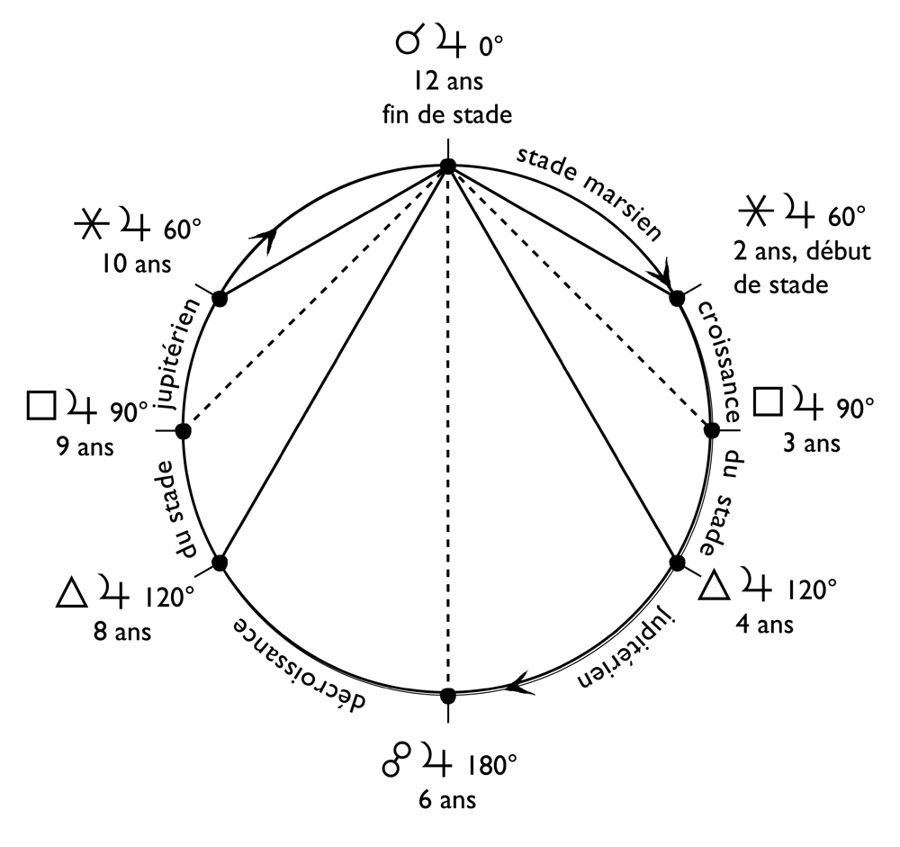 This ability to agree on a rule of the game and to stick to it promotes team spirit: we set common objectives, and may the best win. All this requires knowing how to discuss, rank priorities, systematically organize the activities of the group to which the child belongs (football club, scouts, etc.). Thus the child learns to objectively assess his skills within a community of peers gathered around the same goals, and to play a specific role within this group according to his skills. The Jupiterian age sees the appearance of leaders and arbiters, that is to say children who are invested by their peers with regulatory authority over the group and who represent it to other groups. of children or adults.
This ability to agree on a rule of the game and to stick to it promotes team spirit: we set common objectives, and may the best win. All this requires knowing how to discuss, rank priorities, systematically organize the activities of the group to which the child belongs (football club, scouts, etc.). Thus the child learns to objectively assess his skills within a community of peers gathered around the same goals, and to play a specific role within this group according to his skills. The Jupiterian age sees the appearance of leaders and arbiters, that is to say children who are invested by their peers with regulatory authority over the group and who represent it to other groups. of children or adults.
It is the active acceptance of this collective discipline, these rules of the game, this necessary hierarchy that makes the action of each individual effective at the same time as that of the group. And God knows if the child of this age is thirsty for victorious actions, tangible results, highly claimed successes, triumphs of which he is proud! Within the social group to which he belongs (kindergarten class, sports team, etc.), the child can, thanks to his knowledge of “invariant” constantly making comparisons, as if for him it was necessary that each act, each person, each object be precisely located on an indisputable scale of values: “My dad is taller than yours”, “I have better grades than you”, etc. He now lives in a structured world where each individual is in his place and where he himself, by the sheer force of his will, must organize his life to conquer his place in society.
From two to twelve years old, the child gradually learns to take on responsibilities, provided that they are not too restrictive and that they earn him gratifications, rewards, compliments. He exercises this new sense of responsibility both within the family circle and with the groups of children to which he belongs. At home, he will be proud to be entrusted with the supervision of his younger brothers and sisters, or to participate in the preparation of meals. Within the football team of which he is a part, he will make it a point of honor, if he is a goalkeeper, to defend the territory of his team against the opposing team.
Who says search for gratifying and recognized responsibilities says search for visible power, tangible authority. For the child at the Jupiterian stage, looking after younger children means not only having the pride of deserving the trust of adults, it is also being able to exercise his guardianship over others, giving them orders, being able to allow and in turn prohibit, lay down the law and make itself its representative. Without responsibilities, he can only obey. With them, he puts himself in a position to be able to command.
The feeling of responsibility goes hand in hand with that of usefulness: the child at the Jupiterian stage hates performing tasks of which he does not grasp the purpose, the goal, the usefulness. So he very often tries to make himself useful, without excessive modesty and disinterestedness: “Did you see, Dad, how well I cleaned your car?” Being responsible, being useful, is another way of demonstrating one’s active participation in society, of asserting oneself in it, of acquiring a representative and rewarding status in the give-and-take mode: “I wash your car for you, but in exchange you compliment me on my work and if in addition I could have a gift to reward myself…”
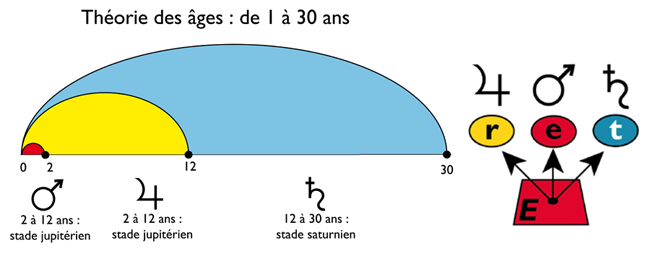
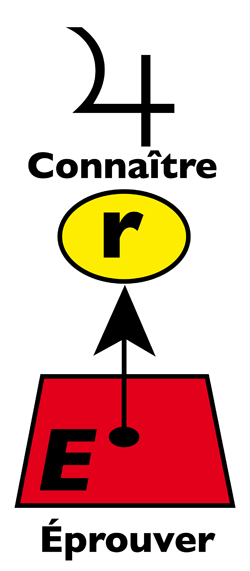
We are in Jupiterian state, like a child from 2 to 12 years old, when we organize our existence, our daily life, our activities and our time according to stable programs, precise goals, concrete projects, pragmatic ambitions, when we seek to put a maximum stability and order in our everyday life by articulating it around fixed, invariable principles and benchmarks. We are in a Jupiterian state when we act according to very clear working methods, using a simple instruction manual with proven effectiveness, when we take into account the concrete characteristics of beings and situations to make them evolve in the direction most favorable to our interests. We are in a Jupiterian state when we apply ourselves to asserting and recognizing the true value of our skills acquired in the field, when we believe that we get nothing for nothing and that it is only fair to be rewarded for the height of our merits.
We are always in a Jupiterian state when we consider it perfectly normal to scrupulously respect the rules and to comply with the laws that regulate life in society, when we seek to avoid, arbitrate or resolve the conflicts with which we are confronted by appealing to the sense of dialogue, negotiation, in everyone’s well-understood interest. We are in a Jupiterian state when we try to convince others that despite the differences and divergences that sometimes oppose us and provided that everyone puts their good will into it, it is always possible to find points of agreement between us, areas of convergence, common denominators that make minimum or maximum cooperation possible depending on the circumstances.
We are in a Jupiterian state when we behave like the representatives, the spokespersons of our social group, when we do not hesitate to show authority and a spirit of decision when it proves necessary to put of order, to guarantee its stability, to maintain its unity. We are in the Jupiterian state when we want at all costs to feel useful to someone or something, when we want to give social meaning to our life, when we act in an exemplary way in the eyes of those around us, when we want let it be known that we have the know-how, when we behave like responsible and disciplined citizens, above all suspicion.
We are still in the Jupiterian state when we exercise common sense, when we do not doubt for a moment the validity of the simple lessons we have learned from experience, when we intervene in daily affairs to make our point. from a reasonable and sensible point of view, when we exercise our faculty of judgment on beings, things and situations. We are in a Jupiterian state when we communicate with others to make them enthusiastically share our opinions, our centers of interest, when we seek to convince them of the validity of our logic, our principles, our benchmarks, our vision. of the world, when we feel the need to illustrate and justify our actions, to interest others intensely in what we do.
With a weakly valued Jupiter in his natal chart, the individual may experience extreme difficulty or reluctance to comply with a common law, to accept to integrate his experience, his personal behaviors within social standards. He can be unreasonable and unwilling to negotiate more frequently than others. With a strong and dominant Jupiter, on the other hand, you know how to organize your activities to the best of your ambitions, integrate effectively into your social environment, impose yourself through your taste for responsibility, your sense of practical organization and your spirit of decision full of common sense and realism.
▶ The Jupiterian: Psychological profile
▶ The jupiterian function ‘rE’ (representation of Existence)
▶ Mars-Jupiter-Saturn: extensive Existence
▶ Sun-Jupiter-Uranus: intensive representation
▶ À propos d’un transit de Jupiter…
▶ Introduction to the Theory of Planetary Ages
▶ L’échéancier planétaire et la Théorie des âges
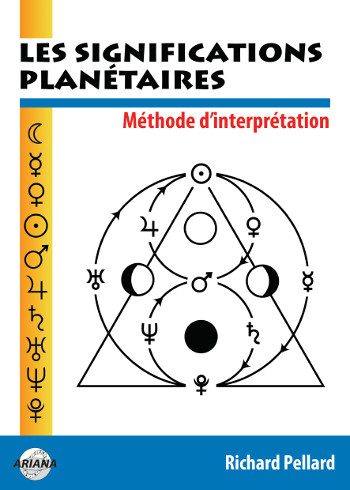
Les significations planétaires
par
620 pages. Illustrations en couleur.
La décision de ne traiter dans ce livre que des significations planétaires ne repose pas sur une sous-estimation du rôle des Signes du zodiaque et des Maisons. Le traditionnel trio Planètes-Zodiaque-Maisons est en effet l’expression d’une structure qui classe ces trois plans selon leur ordre de préséance et dans ce triptyque hiérarchisé, les Planètes occupent le premier rang.
La première partie de ce livre rassemble donc, sous une forme abondamment illustrée de schémas pédagogiques et tableaux explicatifs, une édition originale revue, augmentée et actualisée des textes consacrés aux significations planétaires telles qu’elles ont été définies par l’astrologie conditionaliste et une présentation détaillée des méthodes de hiérarchisation planétaire et d’interprétation accompagnées de nombreux exemples concrets illustrés par des Thèmes de célébrités.
La deuxième partie est consacrée, d’une part à une présentation critique des fondements traditionnels des significations planétaires, d’autre part à une présentation des rapports entre signaux et symboles, astrologie et psychologie. Enfin, la troisième partie présente brièvement les racines astrométriques des significations planétaires… et propose une voie de sortie de l’astrologie pour accéder à une plus vaste dimension noologique et spirituelle qui la prolonge et la contient.
Téléchargez-le dès maintenant dans notre boutique
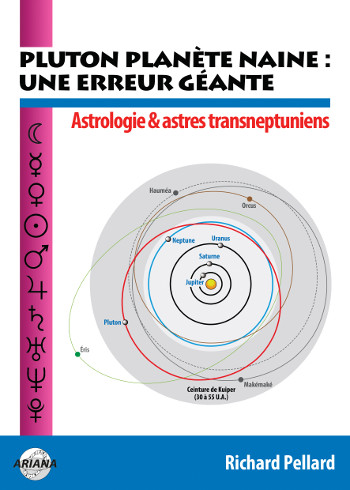
Pluton planète naine : une erreur géante
par
117 pages. Illustrations en couleur.
Pluton ne fait plus partie des planètes majeures de notre système solaire : telle est la décision prise par une infime minorité d’astronomes lors de l’Assemblée Générale de l’Union Astronomique Internationale qui s’est tenue à Prague en août 2006. Elle est reléguée au rang de “planète naine”, au même titre que les nombreux astres découverts au-delà de son orbite.
Ce livre récapitule et analyse en détail le pourquoi et le comment de cette incroyable et irrationnelle décision contestée par de très nombreux astronomes de premier plan. Quelles sont les effets de cette “nanification” de Pluton sur son statut astrologique ? Faut-il remettre en question son influence et ses significations astro-psychologiques qui semblaient avérées depuis sa découverte en 1930 ? Les “plutoniens” ont-ils cessé d’exister depuis cette décision charlatanesque ? Ce livre pose également le problème des astres transplutoniens nouvellement découverts. Quel statut astrologique et quelles influences et significations précises leur accorder ?
Enfin, cet ouvrage propose une vision unitaire du système solaire qui démontre, chiffes et arguments rationnels à l’appui, que Pluton en est toujours un élément essentiel, ce qui est loin d’être le cas pour les autres astres au-delà de son orbite. Après avoir lu ce livre, vous saurez quoi répondre à ceux qui pensent avoir trouvé, avec l’exclusion de Pluton du cortège planétaire traditionnel, un nouvel argument contre l’astrologie !
Téléchargez-le dès maintenant dans notre boutique